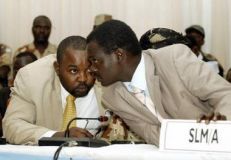Brokered and broken: Darfur’s failed peace deals
June 24, 2007 (KHARTOUM) — The world has devised numerous well-intentioned but ultimately doomed initiatives aimed at ending the bloodshed in Darfur since rebels rose up against Khartoum in February 2003.
 Barely six months after fighting started, the Sudanese government and ethnic minority rebels from the Sudan Liberation Movement signed a ceasefire deal in neighbouring Chad in September 2003, but the bloodshed continued.
Barely six months after fighting started, the Sudanese government and ethnic minority rebels from the Sudan Liberation Movement signed a ceasefire deal in neighbouring Chad in September 2003, but the bloodshed continued.
The rebels want more autonomy and economic development for the region which they see as marginalized by Khartoum, and are seeking a more equitable distribution of the nation’s resources, especially oil.
A new round of peace talks in N’Djamena in December 2003 also failed, followed by an upsurge in fighting in the region which takes its name from one of the main tribes, the Fur people, and the Arabic word “Dar,” meaning home.
Yet another ceasefire and disarmament deal was inked in April 2004 by the SLM and fellow rebels from the Justice and Equality Movement (JEM), brokered by Chad and the international community, but was never applied in earnest.
Nigeria subsequently hosted a series of African Union-brokered peace talks, leading to the SLM faction, led by Mini Minawi, signing a May 2006 peace deal in Abuja.
But SLM dissidents, led by Abdul Wahid al-Nur, and the JEM both refused to sign the agreement that promised a share of political power and resource wealth as well as laying down a timetable for disarmament.
In 2004, the African Union Mission in Sudan (AMIS) started work in Darfur. The force currently has 7,000 under-equipped and under-financed troops patrolling an area the size of France.
Finally bowing to international pressure, Khartoum agreed this month to the eventual deployment of a hybrid AU-UN force of 20,000.
Libya and Eritrea have also sought to play a role in bringing peace to Darfur, with Libyan leader Moamer Kadhafi organising several summits that have led to improved Sudan-Chad relations but no Darfur deal.
Meanwhile, in 2005, the United Nations moved to allow those responsible for atrocities in Darfur to be tried by the International Criminal Court.
Despite ICC summons, no suspects have been handed over. Khartoum insists its courts can try those suspected of crimes including genocide that have killed an estimated 200,000 and forced two million from their homes.
Last month, US President George W. Bush announced fresh sanctions on Sudan over the Darfur conflict, which Sudanese President Omar al-Beshir scoffed at, saying previous sanctions have “been only positive for Sudan.”
This month, France announced an international conference on Darfur, which is to take place in Paris on Monday. Khartoum swiftly rejected it as a distraction to other peace efforts and expressed anger at not being consulted first.
(AFP)
